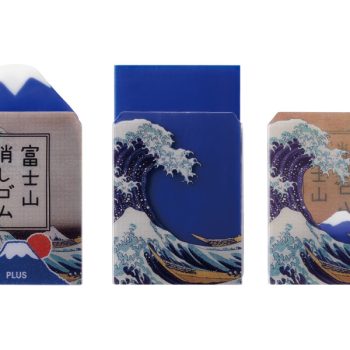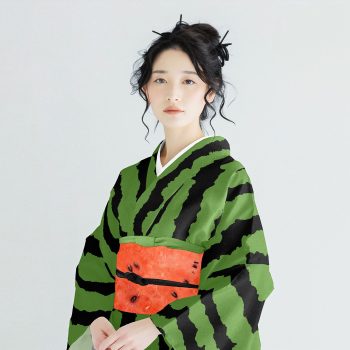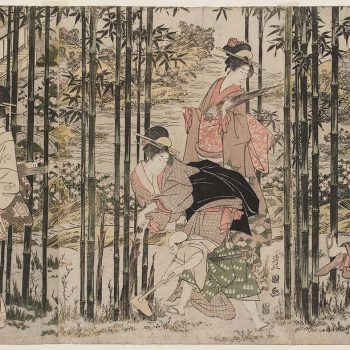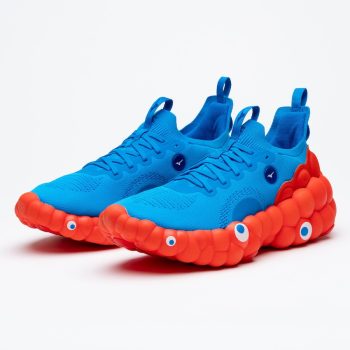FamilyMart, Japan’s 3rd largest convenience store chain, and UNY, the owner of fourth-ranked Circle K Sunkus, merged this week, creating the country’s second-largest convenience store chain. And today, the newly formed company announced it’s new name and logo: FU.
In a press release sent out on September 1, the company stated that the first letters of each company, the F and the U, had been used to create the new entity’s logo. Makes sense. And their corporate philosophy will be “Lifestyle, Fun and New,” which is what we all think of when we hear the word F-U. Maybe the only thing the new logo needs is a large middle finger?
It’s mind-boggling to us that in this day and age a major Japanese corporate is able to label itself FU without anyone raising their hand to say, “Hey guys. I thought you might want to know that, in English, FU can also be short for one of the most offensive phrases there is.” But then again, this doesn’t surprise us because it’s happened time and again and the country doesn’t seem to care. A department store’s “Fuckin’ Sale” and the 2nd-hand cosmetics store Poopdick are just two of the more impressive English-language faux pas. The only question we have is, will their customer service philosophy also be FU?



























September 1, 2016 at 10:53 pm
I don’t know if it’s just my speaking English as a second language, but are the Japanese obligated to care not just a derogatory phrase in a foreign language, but a contraction generally associated with a derogatory phrase in a foreign language? Apparently it’s also the acronym for multiple colleges worldwide.
September 2, 2016 at 4:08 am
On the other hand, 99.5% of their actual customers won’t notice…
September 2, 2016 at 4:57 am
In case you haven’t noticed yet, the rest of the world mostly doesn’t really give a damn about English. Do American companies care what their acronym comes across as in, say, Cambodian? English is completely irrelevant to 90% of the world.
It might come as a surprise to Americans but most people in the world actually don’t care about you.
September 2, 2016 at 6:03 am
Adds another meta level in “lost in translation” 😀
September 2, 2016 at 6:34 am
ファキンーFuckin is the abbreviation of he fast food chain First Kitchen in Japan
September 2, 2016 at 7:17 am
This is just hillarious.
Shows the level of english in corporate Japan, the level of their PR agency and their Design agency… All those who where obviously involved but did not notice.
Especially, since it is written in english letters and not japanese kana or kanji, they should obviously care.
September 2, 2016 at 9:38 am
To people saying “the rest of the world doesn’t care about you”, that’s fine. That’s not the point. Japan has had English fever for quite a few years now. Major companies have adopted all-English meetings and with the 2020 Olympics coming up, there is a MAJOR effort by the government to try and appeal to foreign tourists, who almost exclusively use English to communicate in Japan. On top of that, a lot of Japanese chains have been trying to take their business abroad in recent years.
tl;dr This is worth laughing at.
September 2, 2016 at 6:14 pm
Hell, I’d buy a t-shirt with that logo!
September 2, 2016 at 7:14 pm
福
September 2, 2016 at 7:19 pm
Actually a good example of native English arrogance. “Fu” is a good thing in Japanese and Chinese.
September 3, 2016 at 1:40 am
The name of one of the chains of stores is in English, so, yes, it has some level of relevance.
September 3, 2016 at 2:23 am
Many americans ads or brands are offensive in french (but we think it’s funny).
So … I don’t find it hard to undertand that Japan doesn’t care about the meaning of it’s brand in english 🙂
September 3, 2016 at 2:45 am
An American company creates a stocking/socks brand with a a Japanese cuteness concept, names the brand “Cute Socks” and creates a logo that reads CuSo. (For those unfamiliar with the native Japanese word for poo, now you know. Except it would be romanized with a K instead of a C, but same difference, right?) Would not Japanese find this humorous? Would not Japanese see this as yet another example of the foolishness, ignorance and general self-centeredness that is so typical of Americans?
Here we have “Lifestyle, Fun and New,” which is in itself disrespectful of English, shortened to FU, also meant to be “English”.
It is in no way a case comparable to Matsushita, which was an accident of fate and certainly not English. Nobody was offended by Matsu_shit_a, though no American company would have thought it up as their own name.
To say that many Western brand names, family names and product names sound offensive to foreign ears is to miss the point completely. To say it is arrogant to point out a case of a company writing in a foreign language without thought to what it might mean to native speakers of that language demonstrates a lack of familiarity with logical fallacies.
It is standard practice for major corporations in both the US and in Japan to vet new brand/product/company names through a so-called “negative check” to make sure they are not offensive in foreign languages. It is not arrogant to be offended by a foreign company’s creation in your language. I would say it is arrogant of the Japanese to think they can use English any way they like. At least the French will fine you if you do mess with French in France. The US and English should do the same, as should Japan.
September 3, 2016 at 4:23 am
This kind of thing is the linguistic equivalent of blackface.
September 3, 2016 at 5:24 am
Do they still sell Pocari Sweat in Japan?
September 3, 2016 at 8:54 am
The new logo is an unfortunate choice but why make a big deal of it? I know a UK fashion brand, French Connection UK, goes by FCUK for short and no one question their customer service philosophy.
September 3, 2016 at 12:20 pm
Did you know that in French “fuck” is how you pronounce the name of the seal (the sea mammal). How rude of the coward French not to think about the english-speaking word when naming animals.
Wait, no, we just don’t give a damn.
September 3, 2016 at 5:45 pm
Remember “Siri”
http://www.pcmag.com/article2/0,2817,2394201,00.asp
100 out of 100 Japanese speakers think it’s the funniest name.
しり is often transliterated into “Shiri” in English context;
also can be “Siri” in other languages. In Japanese, it’s not a distinctive feature. ( https://en.wikipedia.org/wiki/Distinctive_feature )
There may be a lot of comedies and tragedies around that.
As well as a German word ‘Ass’.
September 3, 2016 at 6:57 pm
They’ve got everyone on here’s tongues wagging and most likely countless more. That number is only going to climb as the “word gets out” so I’d say the PR and logo Designers have achieved their purpose and earned their salary this month!
September 4, 2016 at 4:14 am
i love spoon-tamago’s site content
but let’s not look at things through specific vernaculars.
i love FamilyMart and it’ll still be a great service.
maybe FU is not as distinctly nicer nor is the logo
granted we old grew to love both their existing signage
prob just f#!$ing time
September 5, 2016 at 1:17 am
Anyone else notice the way the F protrudes into the U?
September 6, 2016 at 5:03 pm
The detractors of English here in the comments very obviously don’t understand the world is an English-speaking world. And that this site caters to individuals who read (and presumably speak) English.
This is simply funny to English speakers who also have a sense of humor. I tend to go around Japan with a mental red pen, corrected “no smorking” signs and so on and so forth. Ask any foreign visitor or expatriate. Incorrect English is rampant; It’s everywhere.
And rather fun, I’d say.
September 7, 2016 at 8:50 pm
What if it doesn’t matter? English-speaking foreigners will get a chuckle from it, it will show up countless times on Buzzfeed and Gawker, but it won’t stop FU from branding and selling to their main customer base. Heck it wouldn’t even stop foreigners from going, it would probably even succeed to attract them without even offending anyone.
Or maybe we have to start considering whether anything we say phonetically is offensive or derogatory to all other languages in the world?
There’s a time and place for that. The time is not all the time. The place is not everywhere.
September 10, 2016 at 12:20 pm
As it’s a Japanese convenience store chain it doesn’t need to pay attention to how its name will sound in English or any other language. Imagine if our Dollar Tree or other American-specific chain had to be cognizant of what their company name meant in other languages.
September 12, 2016 at 11:21 am
Possibly this was intentional by a disgruntled foreign employee who WAS supposed to proofread?! The largest domestic bank in the 90’s was Dai-Ichi-Kangyo Bank (DKB). They launched a huge advertising campaign to tell the public and especially foreigners how much they truly cared from the heart for their business. Every employee had to wear a heart emblem/badge. The ad theme was repeated in almost all advertising — including all trains and subways in Japan (population now over 20 million and several dozen lines!) Also all foreign newspapers in Japan as well as some abroad. The female copywriter was asking to be fired when she wrote the English text for the campaign to be: “Dai Ichi Kangyo has a Heart on For You”. See how her replacement was able to get the job here: http://www.anotherqueerjubu.com/another_queer_jewish_budd/2010/12/the-best-most-strategic-viral-web-copywriting-youll-ever-readtoday.html (at bottom of page…)
September 14, 2016 at 7:50 am
Logo has gone from their homepage today. 160914